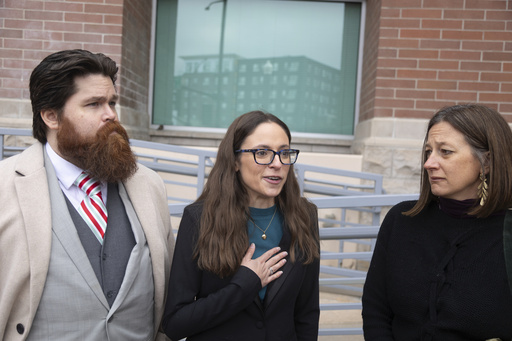
BOISE, Idaho — In a courtroom session on Tuesday, four women challenging Idaho’s rigid abortion laws recounted their experiences of initial joy over their pregnancies transforming into anguish upon discovering their fetuses were unlikely to survive until birth. They spoke about the desperate need to leave the state to obtain abortions due to concerns that complications in their pregnancies could jeopardize their health.
Jennifer Adkins, one of the women involved in the lawsuit, described the feeling of being forced to become “medical refugees.”
The plaintiffs, represented by the Center for Reproductive Rights, are not seeking to reverse the state’s abortion ban but rather are asking the judge to broaden the exceptions to the law. This would allow individuals facing serious pregnancy complications to obtain abortions before their condition reaches a critical level.
Idaho’s near-total abortion prohibition currently categorizes performing an abortion at any point during pregnancy as a felony, except when it is deemed “necessary to prevent the death of the pregnant woman.”
Adkins explained that her fetus had a severe condition that rendered it nonviable and endangered her health by increasing the risk of developing “mirror syndrome,” a dangerous condition associated with severe hypertension among other complications. After receiving continuous ultrasounds showing a heartbeat, she and her husband realized they needed to travel out of state for the procedure.
“I didn’t want to be in a position where I was hoping to see no heartbeat during an ultrasound; it magnified our pain,” Adkins recounted. “I wished for the decision to be made for us and to spare my baby from suffering, making every moment excruciating as we faced the impending challenges.”
Other plaintiffs, Jilliane St. Michel and Rebecca Vincen-Brown, shared equally heartbreaking tales of devastation after learning their fetuses had life-threatening conditions. The requirement to seek care in another state amplified their grief during an already devastating time.
Kayla Smith emotionally detailed her own experience, recalling how she discovered she was pregnant a second time on Mother’s Day in 2022 and picked the name “Brooks” for her son. However, during a routine anatomy scan around 18 to 20 weeks, the sonographer fell silent, revealing severe cardiac anomalies in Brooks — conditions that were unprecedented in severity according to her doctor. Smith described how even if surgical intervention were possible, the accompanying pulmonary issues would prevent survival after birth.
Having had a previous pregnancy complicated by preeclampsia, which necessitated an emergency cesarean at 33 weeks, Smith was aware of the potential risks. “Continuing with the pregnancy would not only endanger my life, as I risked preeclampsia again, but I couldn’t bear the thought of my son suffering,” she stated through tears.
The impending enforcement of Idaho’s abortion ban came just two days prior to Brooks’ diagnosis, severely limiting her options. “It was crucial for us to meet our son in a hospital,” Smith explained. The couple ended up taking out a loan to cover the estimated costs associated with seeking care out of state, where they drove over eight hours to have labor induced. Following the birth, they discovered through an autopsy that Brooks’ heart condition was even worse than initially assessed, leading them to choose cremation and a subsequent trip to recover his remains.
Smith lamented the avoidable hardships, including financial strain and logistical challenges, that would have been mitigated had abortion services been accessible in Idaho.
All four women began their journeys as eager parents expecting another child, only to receive devastating diagnoses that no mother should ever have to confront. Gail Deady, representing the plaintiffs, told 4th District Judge Jason D. Scott that each sought abortion not only to protect their own health but also to spare their infants from pain and suffering.
Deady argued that the current exceptions in place under Idaho’s laws are inadequate and put numerous women at risk, including those sharing similar circumstances.
James Craig, representing the Idaho Attorney General’s office, countered the women’s claims by suggesting they were basing their case on hypothetical scenarios rather than factual evidence. He described the plaintiffs’ suggested amendments as potentially allowing abortions for minor issues that could be easily resolved through other medical interventions.
Craig emphasized the state’s commitment to protecting both unborn children and women, arguing that Idaho’s abortion ban upholds those interests and allows for necessary procedures only in the most exceptional cases. He maintained that asking the court to reinterpret the law encroaches on legislative authority and is not appropriate for judicial review.
The women’s testimonies marked the beginning of a trial projected to extend throughout the month, reflecting the ongoing struggles surrounding reproductive rights in Idaho.
